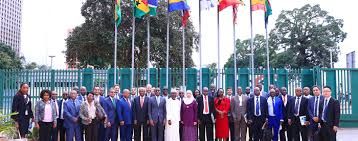Tanko Mohammed
Across the world, the Covid-19 pandemic is deferring major final investment decisions and billions of dollars of capital that were expected to flow into Africa’s energy industry.
This is also along with the pandemic’s subsequent travel restrictions and historic crash in oil prices.
While the impact of the Covid-19 pandemic on the oil market has been unforgiving, the latest meeting of the African Energy Chamber’s Investment & Regulatory Affairs Committees last week tended to downsize the responsibility of such external shocks to explain the lack of investment in Africa.
While it is clear that 2020 will remain one of the worst years in oil & gas history, the end of the pandemic and the rebalancing of the market will not necessarily translate into investments in Africa unless bold reforms are made.
In a high-level conversation with René Awambeng, Global Head, Client Relations, Afreximbank; Chijioke Akwukwuma, Managing Director / CEO, Ocean Deep Drilling ESV Nigeria Limited (ODENL); Nicolas Bonnefoy, Managing Director, Africa Oil & Gas LTD; Bill Drennen, President and CEO, WTD Resources LLC and Gontse Moseneke, CEO, GAIA Infrastructure Capital, the Chamber’s committee members stressed the needs to engage in meaningful reforms while working harder to unlock domestic capital in Africa.
From a regulatory perspective, most African jurisdictions were already uncompetitive for oil & gas investment before the current crisis, and plagued by policy uncertainty and issues around the sanctity of contracts.
While some countries have made remarkable efforts in recent years to reform their legislation, and have become much more attractive and business-friendly jurisdictions, considerable work remains to be done to promote an enabling environment.
Above-the-ground risks such as fiscal regimes, contracts’ sanctity or red tape remain the major obstacles to investment in Africa and capital inflow is unlikely to pick up even under better market conditions, unless something is done about it.
Similarly, substantial work needs to be done on unlocking domestic capital and local currency financing mechanisms that can fully leverage the resources sitting on the continent.
Committee members agreed that there is a lot of capital available to finance Africa’s recovery and fight its energy poverty, from debt to equity, from commercial to institutional money.
However, a lack of engagement, too little capacity building and an overall insufficient knowledge of opportunities and funding tools available are still limiting the ability of African investors to invest in their own continent.
A key issue in this regard pertains to the adoption of environmental, social and governance (ESG) standards.
As investors worldwide continue to embrace the energy transition and adopt strong ESG scrutiny in their investment decisions, the need for African sponsors, developers and projects’ owners to adhere to such standards is dire if they want to appeal to credible investors.
Finally, the rolling out of the African Continental Free Trade Area (AfCFTA) could be a major enabler for cross-border investment and the regionalization of Africa’s energy development.
Such opportunities to work on regional projects, especially on the power and gas side, and to leverage on a free trade area to build new business models should not be underestimated.
Once again, stronger dialogues between African nations, regulators and investors could result in strong projects coming off the ground which would go a long way in supporting future growth across Africa.




